Is it time you had ‘the talk’ with your aging parents?

Another year was coming to an end. Betty Tarr’s husband had died, and she wasn’t the woman she liked remembering.
That woman raised three independent children. She hiked for fun, volunteered in her community, cut her own grass, loaded the debris in her small Ford SUV and hauled it away.
But in 2014, Tarr, 82, was diagnosed with myasthenia gravis, a chronic autoimmune neuromuscular disease that causes weakness in the skeletal muscles. She could no longer drive. She couldn’t clean her house or her yard like she used to. She found herself falling often.
Like so many of her peers, Tarr had vowed never to leave the home she’d shared with her husband.
Her reluctance wasn’t all that unusual, really. The elderly make that vow every day for any number of reasons. They fear giving up their independence. They don’t like confronting their own mortality.
If you’ve ever had to have “the talk” with your parents about why it’s no longer safe for them to age in place, you know it can lead to some salty squabbles.
The Tarrs, fortunately, didn’t have to have that conversation.
Betty Tarr, a retired registered nurse, had had it three times already, and each of those times made the hard decision to move her father, her stepmother and a grandmother.
“I’ve been on both sides,” she said recently. “I know how hard it is.”
By the time her three children discerned it was no longer feasible for her to stay home alone, Tarr had already arrived at that realization.
“It was a blessing she was willing to talk about it,” her son Sam Tarr told me.
And so two years ago, he and his siblings moved their mother from her home in Hartwell into a Wesley Woods Senior Living community in Atlanta.
Terry Barcroft, president and CEO at Wesley Woods, has seen plenty of panicked children walk that same path.
Wesley Woods has 10 communities across North Georgia and serves 1,800 people annually. Those people aren’t proactively planning their best retirement. They are moving into communities like Wesley Woods because they’ve experienced a significant health crisis or because it is no longer safe for them to live alone.
“It’s a really big issue,” Barcroft said. “So many people put that stake in the ground and say they aren’t moving out of a house even when they are struggling to maintain it and are feeling isolated.”
So many parents unrealistically believe they can take care of themselves for the rest of their lives; that moving to a new home is a sign of personal failure.
The truth is, it’s an opportunity for them to thrive, to remain in control of their health and well-being.
“In fewer than 10 years, 1 out of every 5 people in Georgia will be over the age of 60,” said Barcroft. “You are not alone if you are going through this.”
If you find yourself struggling to broach the subject of moving, Betty Tarr suggests you tread lightly.

Barcroft suggests you have the talk early and keep in mind that it might take multiple conversations to arrive at a decision. Either way, it will prevent having to make hasty decisions that do not meet your parents’ needs or reflect their desires.
RELATED: Forest Park most affordable for elderly in metro Atlanta, study says
“The decision about where your parents or loved ones live is an important one that requires a careful, thoughtful approach,” said Barcroft. “Starting the conversation before there is a health crisis is critical for ensuring the best move possible.”
When the time comes for a move, remember nothing beats a personal visit when selecting a senior living community. Beautiful surroundings don’t necessarily mean quality care, so ask questions, Barcroft said.
For instance, does the community provide person-centered care?
Don’t just talk with the management or admissions director. Talk to the staff and the people living there about their experience.
And don’t be afraid of letting go.
“A home is not brick and mortar. That’s just a house,” Barcroft said. “A home is the memories and the relationships you bring with you.”
Betty Tarr understands this perhaps better than anyone.
But she said it’s really OK to look in the rearview mirror. Just don’t stare.
Find Gracie on Facebook (www.facebook.com/graciestaplesajc/) and Twitter (@GStaples_AJC) or email her at gstaples@ajc.com.


